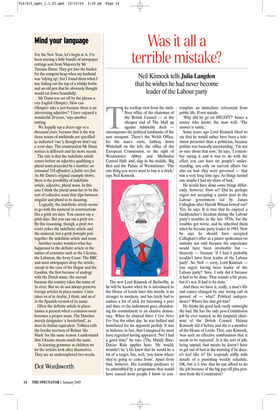Mind your language
For the New Year, let’s begin at A. I’ve been nursing a little bundle of newspaper cuttings sent from Majorca by Mr Terence Dunn. They got into the bucket for the compost heap when my husband was ‘tidying up’, but I found them when I was fishing out the top of a whisky bottle and an old pen that he obviously thought would rot down beautifully.
Mr Dunn was set off by the phrase a very English Olympics. How can Olympics take a just because there is an intervening adjective? ‘I have enjoyed a wonderful 20 years,’ says another cutting.
We happily say a dozen eggs or a thousand years, because that is the way those nouns of multitude are specified (a indicated ‘one’), though we don’t say a score days. The construction Mr Dunn notices is different and far more recent.
The rule is that the indefinite article comes before an adjective qualifying a plural noun preceded by a number: an estimated 318 offenders; a feeble two feet. As Mr Dunn’s original example shows, there is the possibility of indefinite article, adjective, plural noun. In this case I think the plural noun has to be the sort of collective noun that slips between singular and plural in its meaning.
Logically, the indefinite article seems to go with the numeral in constructions like a grisly ten days. You cannot say a grisly days. But you can say a grisly ten. By this reasoning, though, a grisly two weeks yokes the indefinite article and the numeral, but a grisly fortnight puts together the indefinite article and noun.
Another reader wonders what has happened to the definite article in the names of countries such as the Ukraine, the Lebanon, the Ivory Coast. The BBC and most newspapers drop the article, except in the case of the Hague and the Gambia, the first because of analogy with the Dutch name, the second because the country takes the name of its river. But we do not always preserve foreign articles in place-names. Cairo takes an al in Arabic, I think, and an el in the Spanish version of its name.
Often the definite article in placenames is present when a common noun becomes a proper noun. The Marches merely designates ‘a borderland’, as does its Italian equivalent. Tolkien calls the border territory of Rohan ‘the Mark’ for the same reason. I understand that Ukraine means much the same.
In learning grammar as children we let the articles look after themselves. They are an underexplored two words.
Dot Wordsworth







































 Previous page
Previous page